Your basket is currently empty!
Category: Uncategorised
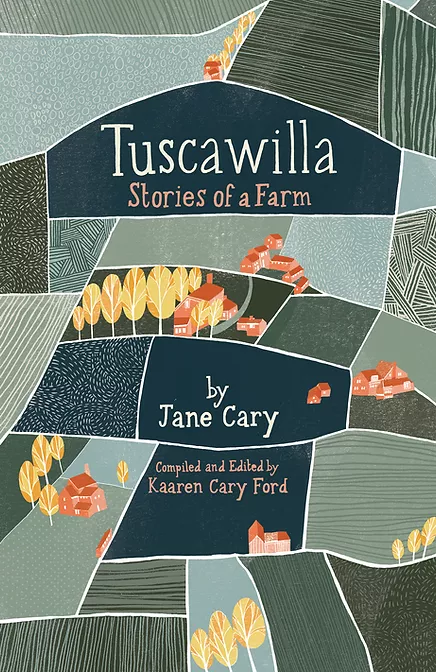
October (almost!)
November, where did you come from?! First thing’s first, we would like to once again thank all of those who have pre-ordered Tuscawilla: Stories of a Farm for their patience. The printing landscape has never been so backlogged, and as a small press we sadly don’t get prioritised for any front-of-the-queue treatment. Scandalous, we know! Rest assured that the book is with the UK and US printers, and it should reach you in November.
Haven’t pre-ordered? Well, if you’ve not started your Christmas shopping yet, this one would make an excellent stocking-filler …
One book that very much HAS made it back from the printer is the Blackwater Press Short Story Collection 2021! This collection of ten wonderful stories, based on the theme of the Blackwater Bird, features tales from writers all over the world who submitted to our short story competition. Thank you also to those who entered our cover contest for this book; your designs had us spoilt for choice. So, whether you’re a bird-lover or simply a fan of great stories, this is the one for you.

Looks pretty, doesn’t it? And we’re not resting on our laurels. So happy were we with the success of this competition that we see no reason to delay the next one. Stay tuned for full details of submission dates and prizes, but in the meantime we are going to hold a vote for what our second collection’s theme should be. Our team have come up with three options that we hope will inspire more great fiction:
Ink
Flight
Seasons
People will be able to vote via our social channels (Facebook/Instagram/Twitter), so follow us on there to have your say next week. For anyone who doesn’t have access to these, feel free to reply to this email and we’ll be sure to add your vote. Exciting!

Finally, it’s that time of year again for students, with exams and deadlines coming thick and fast. To ease the load, we are offering a 20% discount on our editorial services for all current students, to help with any formatting and proofing needs. A fresh pair of eyes can make all the difference. Head here for more information.
Have a lovely week!
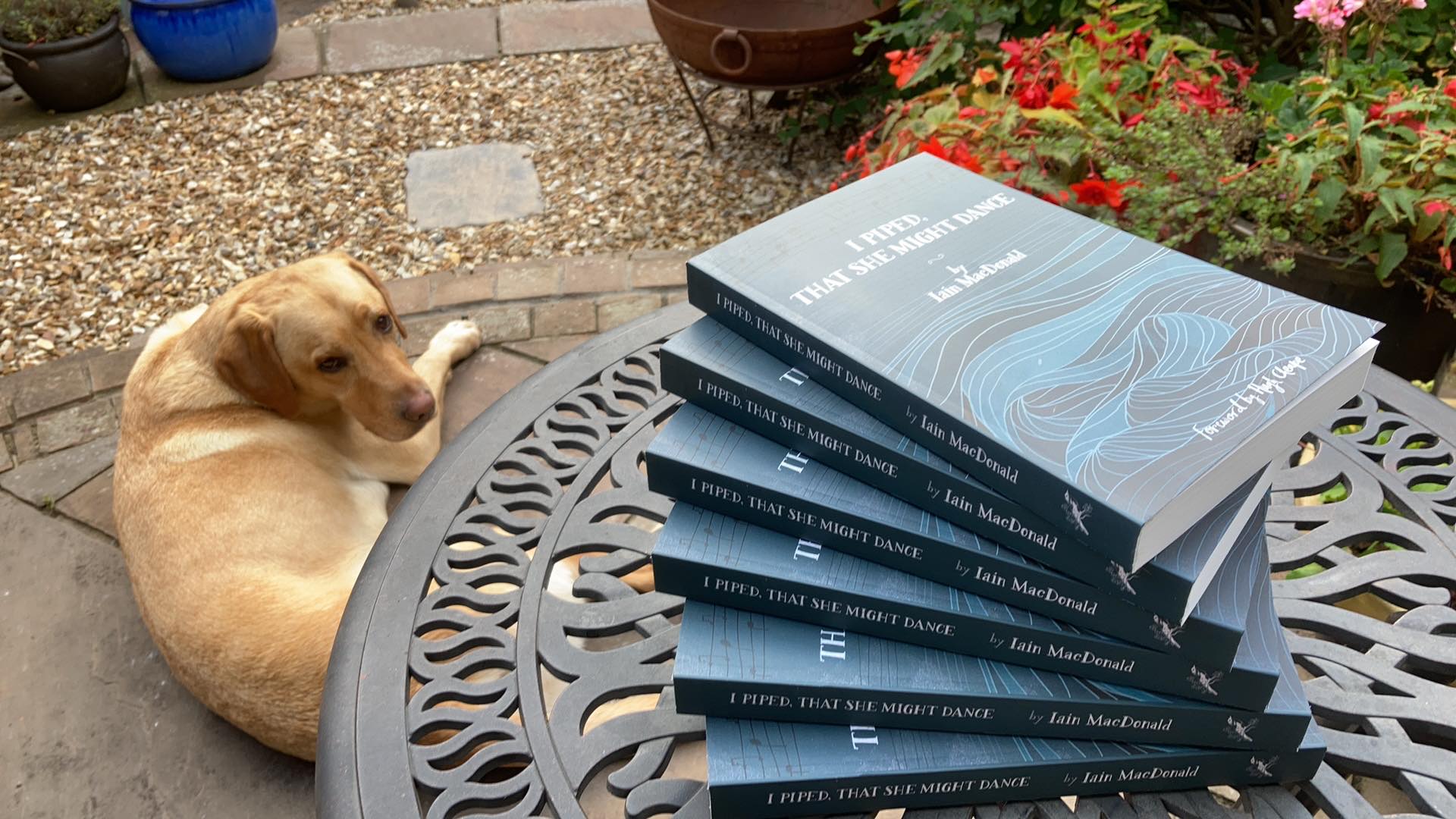
One year on…
September has been a big month here at Blackwater Press for two reasons: The first is that we’ve (finally) published a book! I Piped, That She Might Dance by Iain MacDonald exists in hard copy at last … in Scotland, at least …
We didn’t realize what an impact Covid-19 has had on the book production industry, and so the North American copies are delayed, but should be in the American and Canadian shipping locations by the end of this week (they’ve shipped from the printers!), and then off to our (very patient) pre-orders. Thanks again to all who have received or are still waiting for their book; we hope you will agree that it is worth the wait. Steve thinks so!
The second reason is that we’re a year old. In the past year we have, without ever meeting in person, fought time zones and communicated daily thanks to Zoom and Messenger, learned about setting up an LLC under West Virginia law, navigated some personnel changes, got our editorial services up and running, created a successful short story contest, met many wonderful authors and supportive colleagues, hosted a popular online event for Piping Live! with Iain MacDonald and Hugh Cheape, learned about non-United States citizens who own American businesses negotiate with the IRS (not fun!), dealt with the Library of Congress’s control number system, figured out how to turn a file into a physical book, and more. Most importantly though, John now knows as much about pìobaireachd as Vivien and Gaelic names as Elizabeth!
It’s been a steep learning curve, but we are finally starting to see the rewards of all our hard work, and we are looking forward to continuing to improve as publishers in the future. And, by the end of this year, we will have published three books, one of which – Blackwater Press Short Story Collection 2021 – is at the printers as we speak!

Cover by Zabrina Renfrew 
Five Tips From Editors You (Possibly) Won’t Have Heard Before
Hello:)
You’ve likely run across a few of these pieces before, advising prospective authors on what to do and what not to do, and most of them are very useful indeed! But we thought that instead of repeating what you might have already read, we’d try and think of a few slightly more particular things that you might not have thought about, which could help you before submitting to publishers.
This means that we’ll be glossing over some of the most obvious (but also the most important) things: perfect spelling and grammar; easy-to-read formatting; concise cover email and synopsis; meticulous revision; avid reading … You’ve heard all of these before, and for good reason. But taking all of that as read, let’s dive into some slightly less rudimentary tips that might help set your manuscript apart from the others.
1) FIND THE RIGHT BALANCE FOR YOUR MANUSCRIPT. This is one of the most common reasons we have for rejecting manuscripts that are sent to us, and that’s because it’s the hardest thing for a writer to achieve. Every book – fiction or non-fiction – has its own unique relationship between its plot and the language it uses to convey that plot. Finding the balance in which those things best complement one another is what makes great books feel as though they have been crafted rather than written. In basic terms, sometimes writers focus too much on making each individual sentence sound intricate and wonderful, when in fact there has to be more attention paid to building tension via the plot. Other times, manuscripts are plot-heavy, and in fact would benefit enormously if the author slowed down and found a better way to express their message through richer language. Now, we know what you’re thinking. How am I meant to know if my manuscript isn’t balanced properly, one way or the other? Well, no one said it was going to be easy; in fact, to tell the truth, it’s very bloody difficult! But hopefully our next tip can offer some guidance in that respect.
2) TREAT YOUR FINAL DRAFT LIKE A STRANGER’S. Notice we said final draft. Up to that point, this is probably not sage advice! Writing good early drafts requires belief and compassion and patience, and this is because as a writer you have to be willing to make thousands of micro-mistakes (and therefore thousands of micro-fixes). But when that magical day comes when you find that you have something like a final draft in front of you, this is the time to start looking at your work with the same healthy scepticism with which you would look at someone else’s book you happened to pick up. Reading in this way will help you keep an eye out for any hijinks that this ‘stranger’ might be trying to pull. This should hopefully help you to objectively find the best plot-language balance as mentioned above, among other things. But how can you look at your own manuscript as though it belongs to a stranger? An easy, simple, and cheap solution is to try physically engaging with your manuscript in a different way. If normally you stare at it on your laptop screen, then print it off, or read it on a tablet or on a phone, or send it to a different computer to read on. You could experiment with recording yourself reading the opening chapters and then listening to it (trying not to cringe too much at the sound of your own voice!). Even changing the font and the layout can help you see your writing through fresh eyes. The point is to try and disconnect yourself from the person who wrote the book in the first place, so that you can spot things you wouldn’t be able to spot otherwise. Of course, this disconnect can only go so far, and giving your manuscript to a real stranger – best of all, a professional editor – is simply the number one way of making sure your manuscript can be elevated to publication-standard. And we promise we’re not just saying that!

3) DON’T SUBMIT YOUR MANUSCRIPT UNTIL YOU TRULY BELIEVE IT’S READY. This might sound obvious, but here is another very common thing we see in manuscripts coming through our editorial service. As editors, authors who come to us want us to point out plot holes, loose ends, dips in tension, etc. Yet, when we do, often we are surprised to find that the author already knows exactly what we are talking about! Our feedback might be met with something like: ‘Ah, yes, I was wondering if you would notice that …’ Or: ‘I was hoping maybe I could get away with it, given what happens later …’ If only! It’s safe to say that if there is something about your manuscript that is gnawing away at you, and that you know deep down is causing discord with the rest of the text, then other readers are going to notice, and this is more often than not enough to see your book rejected.

4) WORLD-BUILD THROUGH YOUR CHARACTER’S EYES (this tip is probably geared more towards the fiction writers). Often when people think of spectacular examples of world-building, they immediately look to genres like fantasy and science-fiction. True, there are fabulous examples to be found here, but really, world-building is just as important in literary fiction as well. It has to feel authentic, whether it’s a post-apocalyptic wasteland or a real-life suburban neighbourhood. Be warned, even some novels that are submitted to us that have found their unique sweet spot between plot and language end up getting rejected, if the story-world doesn’t feel authentic. There are a number of reasons why this might be the case. Perhaps the author has not put enough thought into the world around the story, even if they have effectively described the setting directly involved (it’s worth remembering that most world-building should not end up on the page). This lack of a surrounding world can create a sort of vagueness which is so often seen in weak writing. Other times, it can feel as though the minute details that bring a world to life aren’t there, or even if they are, they feel as though they have been thrown in to go alongside the rest of the story, rather than arising organically. Again, we’re not saying this is easy, and it takes time – most writing that feels as though it’s flowed out of someone organically hasn’t! However, one excellent method we can recommend and which almost all good authors utilise is looking at the world through their character’s eyes. This helps build a more vibrant and visceral world than can be achieved when merely examined from the writer’s perspective. Just as in real life, characters inhabit their story-worlds differently, and will do different things when presented with the same scene. Describing the particular ways in which a character chews her sandwich or gets out of her car or says goodbye to her grandma can do so much. These things might feel insignificant, but they really will vary depending on age, class, mood, health, race, gender, financial situation, political persuasion, relationship status, etc. What would your character do that another character might not? Even if you’re using a third- or second-person narrator, writing with the immediate detail of first-person can really bring a world to life.

5) HELP US MAKE MONEY! All publishers need to keep making money to stay afloat, but depending on their size, how they make money is different. Big publishers tend to publish hundreds of books a year and hope that a handful become bestsellers, whereas smaller publishers really need to make money with every book. If an author shows us that they have faith not only in their manuscript, but in how our business could profit from turning it into a book, then we’re on to a winner! At Blackwater we try and tailor our marketing for each book we publish, but if an author comes up with innovative ideas – even at submission stage – about how they could help successfully promote and sell their book, and prove to us that they would actively help us to make more money, this will ensure that us and any publisher look at their text more favourably. It’s the least romantic tip in this list, but it’s just as important as the others!

We hope that this was useful for all those authors working away on their manuscripts, and that at least some of it was fresh! We should caveat it all by adding that writing is a wide-ranging medium, and not all works will necessarily benefit from the same treatment. Even if they had the same word count, a short story by Alice Munro would be a wholly different experience to a short story by George Saunders, and likewise a novel by James Joyce would be incomparable to a novel by J.K. Rowling, and then again to George Orwell, and then again to Margaret Atwood. Yet all of these writers are considered great, which brings with it the welcome relief that there is a lot of room for idiosyncrasy in this field. Enjoy the process and good luck!

A visit to Tuscawilla
Updated: Jul 30, 2021
Tuscawilla Farm is the ancestral home of two families: the Knights and the Carys. Our forthcoming title – Tuscawilla: Stories of a Farm – gives a history of the families and their work between about 1860 and about 1960. The book originated as a pile of handwritten stories on legal tablet written by my great aunt, Jane Cary, better known as Big Jane. My mother, who grew up on Tuscawilla, had them transcribed and edited and compiled the stories for publication. The result is a fascinating mix of family and local history, descriptions of farm life and work, and recipes.
My mother has been talking more and more about life on the farm, and in preparation for publication I thought I needed to see it again with fresh eyes to get a sense of the place and the layout, so on a Sunday in early July we went to Lewisburg and out to Tuscawilla.
The lane up to the farm from Route 219 is lined with thorn hedges, and when I was little and they were in full force, I thought it was like the way to Sleeping Beauty’s castle.

We parked at the flower garden, near one of the barns. The formal flower garden was designed in the 1920s by a Mrs. Bell from Cincinnati. My mother can remember it being full of peonies, delphiniums, daisies, roses, Canterbury bells, and always impeccably tidy. The house she grew up in faces the garden, and I suspect this was a significant influence on her own love of flower gardens. I remember helping Aunt Jane to tidy the beds with my useful small hands, and once when my cousins were visiting, my cousin Tyler and I left her younger brother in a tree in the garden.


The farm buildings are much closer together than I remember them being when I was a regular visitor. The brick house is at the top of the lane, then the flower garden to its right with the chauffeur’s house behind it, then one of the barn complexes including apple room and milking parlor, and then the Cary house, which was built for my great-grandfather’s family. And then, fields in all directions. I remember when the pens near Aunt Jane’s house were full of pigs, that would come up to the fence when they saw people. I always tried to talk to them in pig grunts.
I went into the barns for the first time—not in active use, it wasn’t nearly as dangerous as it was in Aunt Jane’s time—and saw many pieces of old farm equipment she describes, including the cider press and manure tub, the milking parlor, the apple sorting rooms, and many holes my mother fell through as a child.


Back outside, the view from behind Aunt Jane’s house is exactly as I remember: two ponds, fields, a few scattered buildings, and mountains. The sawmill was in this direction, and the orchard, though at one time apple trees were in the fields right up to the houses. I remember Aunt Jane taking me to the orchard on her tractor when I was four or five. My mother’s favorite view of the gap from the back windows of her home, showing Greenbrier Mountain, Kate’s Mountain, White Oak Mountain, and Muddy Creek Mountain, is what she envisions Heaven will look like.

I’ve gained a new appreciation for my family’s history and home while working on this book and been reminded again and again of what an interesting, knowledgeable, and loving person Aunt Jane was, and how much she is missed. Publication will be later this year; pre-order here.

In other news…
The book launch for I Piped, That She Might Dance, has had to become a Facebook Live event, due to ongoing Covid-19 related restrictions. Follow us and The National Piping Centre on Facebook for details; the recorded event with author Iain MacDonald and Professor Hugh Cheape of Sabhal Mòr Ostaig will be available for viewing from August 9. Pre-order here for publication in August.
We are pleased to announce the winner of our first-ever cover contest: Zabrina Romero Renfrew’s design was the favorite of our social media followers. Congratulations Zabrina! We think it will make the perfect addition to our diverse collection of bird-themed short stories, and look forward to seeing the cover in print. Also, a massive well done to our other brilliant finalist, Chloé Harmsworth. Pre-order here!

Cover by Zabrina Renfrew 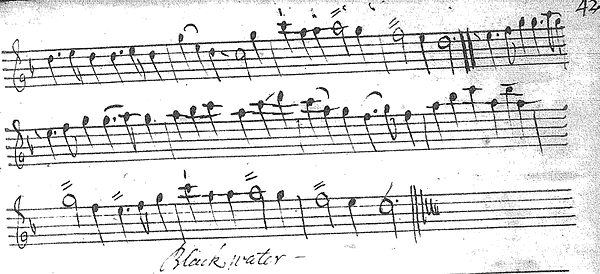
The Blackwater Tune
Blackwater Press is, so far as we know, one of two publishing companies with its own tune.
The tune was found in manuscript 353 from the Montagu Music Collection, Boughton House (“Blackwater” from GB-Ketmmc 353, c.1720, The Montagu Music Collection, Boughton House. By kind permission of His Grace the Duke of Buccleuch and Queensberry KBE and the Trustees of the Buccleuch Living Heritage Trust)
The manuscript is small, and bound in leather with sugar paper covers. It was signed by the 3rd Duchess of Buccleuch (1743-1827), but she was not the manuscript’s original owner, as it dates from around 1720. In all likelihood it originated in her family. This manuscript contains 62 brief single-line tunes for a treble instrument, most likely recorder. The contents are a rich sampling of popular music tastes in country houses in early eighteenth-century Scotland: excerpts from popular theatre songs and Purcell’s operas are alongside well-known Scottish tunes such as “John Anderson My Joe” and movements from Corelli’s violin sonatas.
Two of the tunes have no known concordances, and one of those is Blackwater. Blackwater is a dance—either a gigue or a lourée—that hovers around the key of D minor but lacks some of the characteristics of that key, suggesting an origin well before the early eighteenth century. This is functional music that would have been played over and over for dancing, and ornamented by the players. Some indication of an ornamentation style are present in the manuscript. The symbols resemble those found in Purcell’s 1696 A Choice Collection of Lessons for the Harpsichord or Spinnet, and are somewhat unusual for wind music.
As for the name Blackwater, that’s another mystery. Tune names came from many sources, and the same tune can be known under many different names. A regional association is tempting as both Ireland and Scotland have Blackwater Rivers, but it this seems unlikely as there is no connection with Ireland and this source, and the manuscript is from Lowland Scotland at a time when the Highlands were in essence a separate country. In all likelihood the name Blackwater had a personal association for the creator of the manuscript, its original owner, and/or his teacher. If any reader knows any other source for this tune, please do get in touch!
Full contents of this manuscript are available in modern edition here.
I Piped, That She Might Dance Live Event 2021
We are delighted to announce the launch event for our upcoming title I Piped, That She Might Dance by Iain MacDonald. The launch will be taking place at Piping Live! Festival on August 9 at 12PM (UK)/ 7AM (EASTERN US). Iain MacDonald will be in conversation with Hugh Cheape, and will premiere his new composition, Salute to Angus MacKay of Raasay. The decision is yet to be made whether or not the event will be available to attend in person this year due to COVID-19 restrictions, however, closer to the date we will be sharing a link that will allow you to stream the event live online. We are aware that 7AM (or even earlier for our author!) may be slightly early for some… but fear not, the event will be recorded so you can watch the stream at a more convenient time.
Cover Contest – Blackwater Press Short Story Collection 2021
Another reminder this month to get involved or share the word of our cover contest for the Blackwater Press Short Story Collection. This contest is free to enter. The winner will receive a free copy of the book, credit as the official cover artist, and worldwide respect! Your cover design must include our bird logo and the title: Blackwater Press Short Story Collection 2021.
(versions of logo available here)
The deadline is creeping closer… send us your submissions to by the 1st of July.

Blackwater goes bilingual
We are thrilled to welcome our brand-new team member, Vivien Williams. One of the many fantastic things about Vivien is that she is fluent in not one, not two, but FOUR languages ( and she is working on adding two more to her repertoire). This is a huge perk for us as we can now offer translation services. Vivien speaks English, French, Spanish, Italian, a little German and a touch of Hindi. If you have any projects requiring translation from Italian, Spanish, or French to English, we are ready to assist.
Now, a bit more about Vivien…
n 2010 Vivien Williams moved from southern Italy to Scotland to pursue a PhD at the University of Glasgow on the cultural history of the bagpipe. With several postdocs between Edinburgh and the Warburg Institute in London, bagpipes remain her preferred research – and conversation – topic. She is a Research Associate at the University of Glasgow, working on projects in the digital humanities including Editing Robert Burns for the 21st century; the Hunterian Associates Programme; The Cullen Project; Curious Travellers; Seeking Refugees from Slavery in Sierra Leone; and The Jacobite Officers Database. The freedom afforded by a digital career offered the opportunity to move to a remote Adriatic island, where she currently lives. At the age of seven she wrote and published a little book called Grandi Amici, and in adulthood has won several literary prizes for prose, poetry, and poetic translation. Uncharacteristically for fellow Blackwater Press staff, she does not have a pet, but does tend to name insects who find themselves trapped in her home.
SHORT STORY CONTEST UPDATE
After receiving many fantastic entries, earlier this month we selected the winners of our first short story contest. The winner was Marie Gethins with ‘Birds of Egypt’. Our two runner- up spots went to ‘To Pierce the Dark’ by Malina Douglas and ‘The Field’ by Alexandra O’Connell. The collection, featuring the top ten stories, is now available for pre-order for $14.99[E3] .

COVER CONTEST
Now that the content of our short story collection is in fine shape, we want it to be wrapped up in a beautiful cover. We thought the best way to do this was to invite all of you to get involved and take part in our Cover Contest. This contest is free to enter, and we will select a winning cover to print on the books. The winner will receive a free copy, worldwide respect, and will be credited with the design inside of the book. All we ask is that the cover include our bird logo (attached), and the title: Blackwater Press Short Story Collection 2021.
Send your cover submissions to submissions@blackwaterpress.com by July 1.
EARTH DAY
We at Blackwater Press join the world in celebrating Earth Day on April 22nd 2021. We are called to reflect upon the earth, how it gives to us freely and abundantly, and how we are called to give back, with increasing urgency. Earth Day is about sustainability: ‘Restore our Earth’ is this year’s theme.
What can we do, therefore, to restore our earth? What does the earth need for us to do, concretely? Can a publishing house play its part?
We believe that indeed it can. On Earth Day more than ever we reflect with a sense of pride and self-awareness on our role as a small press. In a world dominated by publishing giants, distribution colossi, and global titans of sales, making the choice of remaining a small independent publisher is an act of courage.
It doesn’t come without its disadvantages. Not using the ‘established’ channels, not walking down the path of ‘sure sales-boosting marketing’, not caving in to convenience, can raise insecurities across all the levels of the publishing business – from concerns expressed by authors, queries from customers, availability of our titles in large chain, and many more. But we stand by what we do, and we believe that this is the way forward. The earth has long been sending signals for humanity to take that step back, and return to a more human-scale lifestyle. Everything which has reached disproportionate levels of ‘success’ has backfired, at some point with consequences on our environment, on our fellow earthlings and people. Is this the meaning of success, then? We don’t think so. We believe in delivering quality, in a world which has tantrums over quantity. We do our best to preserve our moral integrity: we made this promise to our beliefs, to our readers, and – why not? – to our earth.

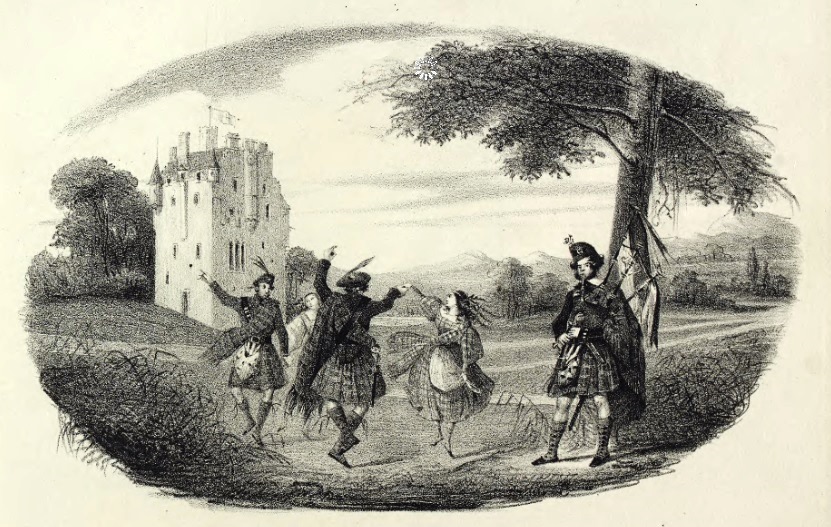
I changed my life for…
Complete this sentence:
I CHANGED MY LIFE FOR…
Think about it, and we’ll all come up with a different answer.
I, Vivien Williams, changed my life for bagpipes.
I know, it’s as absurd as it sounds.
And yet it’s true (and also an excellent conversation starter, I will have you know).
I’ve been writing and researching about bagpipes since my high school years. I moved to Scotland to do more of that in my PhD. I followed through with various postdocs, in which the bagpipe was protagonist.
I am a bagpipe scholar. I’ve tried rebranding myself as an 18th-century specialist, as a cultural historian, as an expert in the digital humanities…All true, but deep down I know: over and above everything else, I’m a bagpipe scholar. Present me with a topic related to the 18th century and I can develop it; cultural history is an amazing perspective into knowledge; I’ll create databases and work on XML files and turn them into complex projects…bagpipes just make it better. Come up with any word, and I’ll connect a bagpipe fact to it. It’s been like this since I was 16.

Which is why I couldn’t believe my luck when I joined Blackwater Press and was presented with their (now our!) first venture: I Piped, That She Might Dance by Iain MacDonald. A book about the Angus MacKay! The one with the famous Victorian portrait! The first piper to the Queen! The one whose A Collection of Ancient Pìobaireachd I pored over for hours in Glasgow University’s Special Collections library!
My enthusiasm at being an editor was never in need of a boost, but I can say that for me it started with a bang. Going through Angus MacKay’s compelling life story gave me the opportunity to follow the leads and cues in the novel to do some research into the nitty-gritty details of the topic – and get beautifully side-tracked in the process, which is one of the delights of research. Did you know the first edition of his Collectionhad 275 copies printed for subscribers? And that the book was priced £1.15? Oh, and if you knew the beauty of pìobaireachds like ‘Iseabel Nic Aoidh,’ or ‘Cogadh na Sith’…

Editing this novel has got me polishing my notions about pìobaireachd – such amazing, complex music. Pìobaireachd is commonly known as the classical music (cèol mòr, or ‘big music’, in Gaelic) of the Great Highland bagpipe, because it’s formed by a theme – called Ùrlar in Gaelic – and variations, which increase in complexity and virtuoso until they reach the climax of the Crunluath A Mach, where the theme is so hidden by the flourishes of the variations that it almost feels irretrievably lost…until the pìobaireachd returns to the Ùrlar, and thus comes to an end, concludes its journey, comes back home.

We need to bear in mind that the scale of a Great Highland bagpipe is made up of an octave and a note – imagine having an alphabet made of nine letters. You need to create meaning for the whole spectrum of human existence out of these nine sounds. Not easy, right? For this reason, a Great Highland piper pays painstaking attention to even the subtlest comma when tuning the bagpipe: that one note needs to carry so much meaning, that it’s important that the note and pitch is exactly right for that particular piece. What’s more, every note has a particular meaning, so F for instance is the note of love, G the note of sorrow, and so forth; so an expert in pìobaireachd would understand the reason and meaning behind the predominance of a certain note within a given piece, or within a given variation.
Yes, the world of bagpipes is vast, full of quirks, and really underestimated, if I may say so. Surely I Piped, That She Might Dance will uncover some of its beauties, while exploring the life of a man who left his mark in the world of piping.
Pre-order here.
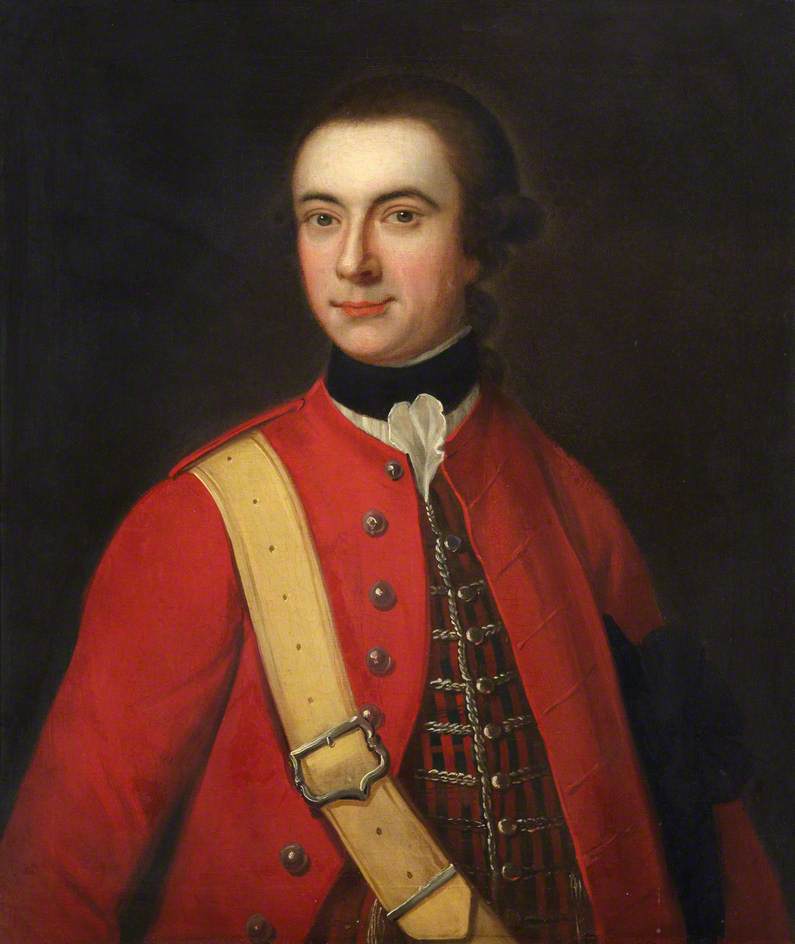
The John Reid tribute blog!
This month’s newsletter has almost nothing to do with Blackwater Press. It is all about John Reid. Not our co-founder. The dead one.
CONTENT WARNING: If you don’t want to geek out and learn about an influential 18th-century flutist, this newsletter perhaps isn’t for you. Keep your eyes peeled, though, as a Q&A with our incredible cover designer Eilidh Muldoon is coming soon!
John Reid (1721-1807) was a British army officer, amateur composer, and flute player. He is one of the most significant characters in the history of music in Scotland, and one of my favorite historical characters (Elizabeth typing, btw). A happy coincidence then that I work with his namesake. See the similarity?

John Reid – the original – was born on February 13, 1721 at his ancestral home at Straloch, Perthshire, the son of Alexander Robertson of Straloch. John assumed the last name Reid upon inheriting the estate. Reid comes from the Gaelic Ruadh, or Red. Red Robertson. The family was opposed to the Jacobite cause. John’s father suffered many losses in resisting the 1745 rebellion, and he was commissioned into the British army as a lieutenant in Lord Loudon’s highland regiment on June 8, 1745 in time for the battle of Prestonpans.
John’s career was long and reasonably distinguished. He was nearly court martialed for lying about orders to capture troops in Tongue Bay in 1746, but the attack forced a surrender, so it worked out for his side. He went on to serve in Flanders, and in 1748 purchased a commission in the 42nd Regiment of Foot, better known now as the Black Watch. He was promoted to brevet lieutenant colonel in 1762.

John arrived in the American British colonies in October of that year and defended Fort Pitt from attack by Native Americans in June 1763. The rest of his career was spent in North America; he married the daughter of a settler and purchased 35,000 acres of land in Vermont. This land was seized by colonists in 1774, and the War of Independence prevented him from seeking a remedy. He was promoted to general in 1798.
But his real renown was for music.
The flute was one of the most popular instruments for gentlemen amateur musicians. It was expensive and difficult to play well, therefore requiring a disposable income and leisure time for practice. It was also generally associated with masculinity, war, and seduction. One of the most famous amateur flute players of the eighteenth century was Frederick II of Prussia, better known as Frederick the Great.
Several accounts survive of John Reid’s flute playing. Around 1770, after hearing Reid play in Edinburgh, Alison Cockburn wrote a rather sexually charged account of his performance to her friend Miss Cummings, in which Mrs Cockburn sounds more like a teenaged girl swooning after the latest boy band than a respected society matron describing a flute recital: “Of all the sounds I ever heard (and my soul has soared to heaven before now), Colonel Reed’s flute, well, it is amazing the powers of it. It thrills to your very heart. He plays in any taste you please and composes what he plays. You know my taste is for the penseroso and so it is his. He played me five acts of a tragedy that went to my heart, and I spoke in to myself all the words of it. I would not let him speak the epilogue… He is a gentle, melancholy, tall, well-bred, lean man; and, for his flute, it speaks all languages. But those sounds that come from the heart to the heart – I never could have conceived it. It had a dying fall – I was afraid I could not bear it when I heard it perfectly. I can think of nothing but that flute…”

So yes, if this account is anything to go by, John Reid was hot!
But his most important legacy to musical culture in Scotland was the codicil to his will. Following the life interest of his only daughter, he left the bulk of his estate to the University of Edinburgh, where he had been educated, to endow a chair in music and start a music department. Reid’s music collection is still intact in the University of Edinburgh’s Centre for Research Collections and offers great insight into the tastes and interests of Scotland’s best-known amateur flute player. The Reid School of Music at the University of Edinburgh is the oldest university music department in Scotland. The first Reid professor, John Donaldson (1789-1865), added an instrument museum to the Reid Hall. This has now moved to St Cecilia’s Hall, where Reid’s portrait once stared me down as I performed the sixth sonata from his first collection on a program during the 2014 Fringe.

Every February 13, the University of Edinburgh hosts a concert in honor of General Reid featuring one of his compositions, as stipulated by the bequest in the codicil. Not this year, however. Instead, I hope you are able to spend February thinking about good-looking officers and listening to inspiring flute music. Keep the smelling salts at hand!
And if you’re at all inclined to read about another famous character from Scottish music history, take a look at our title I Piped, That She Might Dance, by Iain MacDonald, available for pre-order here: https://www.blackwaterpress.com/books
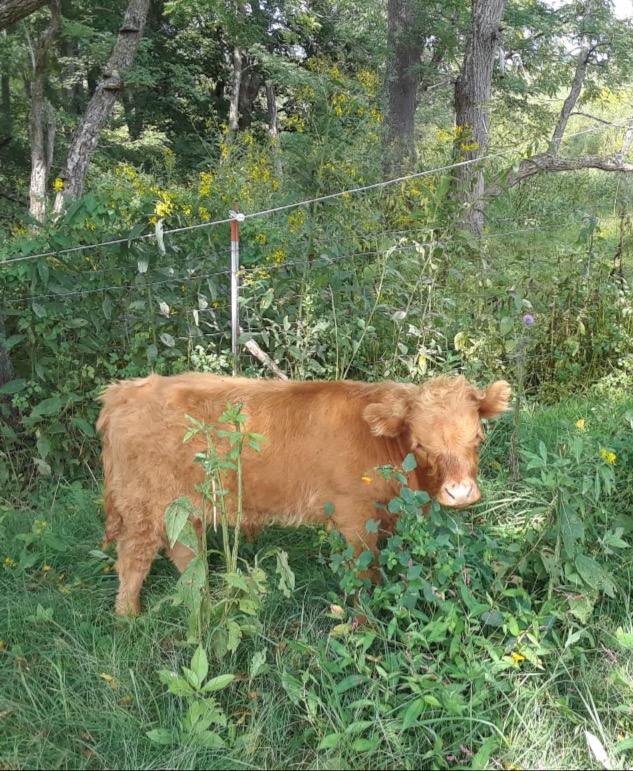
Thank you!
Hello all,
It’s been a great couple of weeks! America came to its senses; Biden pledged to re-join the Paris Agreement; real-life COVID-19 vaccines were announced; Scotland actually qualified for a major football tournament! And now Blackwater Press has launched its first short story contest … 2020 might be finally turning around!
In light of this, we’d like to take the opportunity to thank everyone who has helped Blackwater Press get off the ground. On both sides of the Atlantic there have been so many people that have contributed in some way – or roped into it by one of us – and we are sure this list will only grow.
So, in no particular order, enormous thanks to:
Edinburgh University/Edinburgh Innovations for trusting us with their grant, Iain MacDonald for being our first author, Mandie Peterson for her work on our logo, Anna and Helen Reid for their website help, Susan Reid for her typing, Eilidh Muldoon for her incredible artwork, Meyer, Ford & Glasser, PLLC and Clinton Family Dental for their contest sponsorship, Baillie McLean for his brilliant work on our social media, Larry Ford and Debra Hutcheson for keeping us legal, Robert Davidson from Sandstone Press for his sage advice, Phil Dunshea and Alison Mero for their publishing industry guidance, everyone who has followed us and shared our posts across the various platforms, all of the many readers for their reports on manuscripts, and many more.
Finally, to all those who have pre-ordered books, chosen to use our editorial consultancy, submitted their manuscripts to us or entered our competition, at the end of the day this is what makes small press publishing possible, and so we thank you for that. We know that this has not been an easy year for anyone, but seeing that people are still as interested in literature as ever has given us the determination to publish the best titles and offer the finest editing for years to come.
Final thanks to Buford – Elizabeth’s cow – for modelling for our blog.
